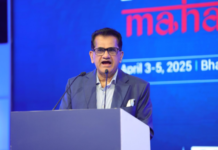New Delhi– Accel, one of the world’s top venture capital firms, has identified ‘Bharat’ as a massive blue ocean opportunity for Indian startups, citing promising economic indicators and evolving consumer behaviour across Tier 2, Tier 3 cities and rural areas.
Accel defines Bharat as middle-income households that earn between INR 5 to 15 lakhs annually and spread across Tier 2, Tier 3, and rural India.
In an exclusive interview with IANS, Anand Daniel, partner at Accel, discussed the immense potential of building for Bharat. Historically, startups have struggled in these markets due to inadequate infrastructure, limited digital penetration, and insufficient understanding of consumer preferences, Daniel said.
The recent advancements in technology, logistics, and payment systems have laid a foundation for sustainable growth in these underserved regions, he added.
Despite the common belief that rural means poor, the top 20-30% of this untapped market spends more per month than about half the population in urban cities, Daniel told IANS. This highlights a substantial purchasing power in rural areas that is often overlooked.
In a recent blog, Accel wrote that contrary to conventional notions, which paint this demographic as primarily price-sensitive, this segment is highly aspirational and shows a growing preference for products and services that promise a better lifestyle and reflect upward mobility. This trend is exemplified by a surge in the demand for used iPhones in Tier 2 cities and beyond, the VC firm added.
“We believe this market is more ripe for disruption than ever before. Founders need to take a crack at the Bharat Opportunity,” Daniel said.
The ‘build for Bharat’ theme has gained momentum among investors such as Accel and entrepreneurs alike, reflecting a strategic shift towards developing business models that cater to this segment of India and its unique needs.
But why have startups not succeeded in building for Bharat till now? Until recently, startups aiming to serve rural India struggled due to inadequate infrastructure, unaddressed customer behaviour, and a lack of focus, according to Accel. Challenges included poor delivery networks, incomplete pincode coverage, and inefficient reverse logistics, which inflated costs for handling small orders. Sparse digital payment options and unreliable internet connectivity added to the problems.
However, recent advancements are reshaping the landscape. The introduction of the UPI payment system has revolutionised transactions, while initiatives like Jan Dhan accounts have significantly boosted financial inclusion. Logistics firms now offer broader pincode coverage and faster delivery times, marking a pivotal improvement. These developments will unlock opportunities for startups seeking to tap into Bharat, potentially transforming how services are delivered and accessed in rural areas.
Accel anticipates that in the next decade, several enduring e-commerce companies valued at over $1 billion will emerge for Bharat. Financial services are also poised to expand, providing accessible lending solutions to underserved segments.
“From personal loans to loans for cattle or house financing, a new set of lending companies can leverage technology and provide tailored products at the right price to cater to the underserved and aspirational Bharat,” Daniel said.
Healthcare is also a ripe opportunity for innovators. In addition to that, ed-tech platforms will proliferate, addressing skill gaps and employment needs with cost-effective education and certification programs. With the advancement of artificial intelligence, startups are innovating across domains.
“We are looking for AI’s first consumer company, which will enable Bharat’s mass audience across sectors,” he noted. (IANS)







